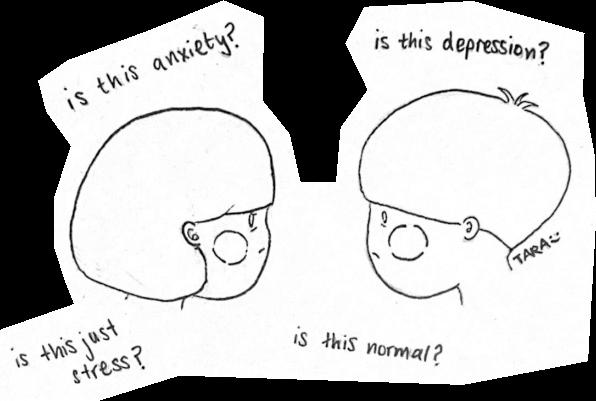
3 minute read
A Day Off
from November 2021
by Giulia Martinez-Brenner
I never expected to see generational differences in the span of a year. At risk of sounding like an old ninny, I must admit that I am noticing specific contrasts between me and those just a couple years younger, and the one I want to reflect on here, is the relationship to mental health.
Advertisement
I have seen such an increased awareness and sensitivity to this issue that fills me with hope. I have seen younger people so much more comfortable setting healthy boundaries, knowing their limitations, and giving themselves a break. It is not an exaggeration to say it’s an admirable stance. I feel second hand pride, and real respect, when my peers not only listen to their needs, but act upon them– when they allow themselves to take the space and time necessary in a moment of mental distress.
And yet, the fog of cynicism always finds a way to block out some of the light. There are certain things I must ask myself. I will tread lightly, I know I must be careful with this topic, and it is not an easy matter to speak of. But squint through the mist with me, and let’s tentatively pull some things out of the dark.
My first point of friction always involves definitions. When someone speaks about a “mental health issue”, what exactly do they mean by that? Now I do not mean something has to be diagnosed to be valid, nor do I want to undermine anyone’s subjective experience. What I have noticed though is that there is a tendency to medicalize the normal, to toss the words “depression” and “anxiety” around without a second thought.
"Being sad because of a breakup is not the same as depression, just as being nervous before an important presentation is not the same as anxiety" can take a day off or not, nor am I anyone to judge their reasons to do so. This is not just about UCU either. Everywhere there are people who use the stress card and others who cannot afford to do so having to pay double the price.
I recently spoke to someone who talked about having mental health issues because they had broken up with their partner and was having a hard time adjusting. But is that a mental health issue? Or is that a perfectly natural reaction to an upsetting situation? Negative feelings are part of the messy and fallible human condition.
The problem arises when they are groundless and unbearable, when the re action is disproportionate to the cause. Being sad be cause of a breakup is not the same as depression, just as being nervous before an important presentation is not the same as anxiety. Sure, there is no distinct line to draw between the normal and the abnormal, yet it is precisely because of this that I want to raise the issue.
While mental suffering may have been ignored or invalidated before, and that divide was very much skewed to one extreme, now it has shifted to the opposite end, where natural vulnerabilities are automatically problematized. My reason for discomfort does not concern the great steps mental health awareness has made, it involves the type of frantic self-diagnosis that causes people to run away from any form of discomfort, denying themselves those feelings of tenderness or pain which constitute the imperfect act of living in itself.
And not only the act of living, which brings me to another aspect that I have noticed. For recently, I’ve seen many instances in which this newfound sensibility is actually being used as a release from responsibility. Here, my question is not just about definitions, but also who is actually in the position to use them?
That overwhelming stress that I think most of us may be familiar with, is a big problem. And parts of it can definitely be attributed to unhealthy societal standards. However the ability to just “take a break”, to “have a self-care day”, to detach and switch off, is something that not everyone can afford to do. I am no one to legitimize when one
Does this mean the need to take a break should not be more normalized? Not necessarily. On the contrary, that may even be the answer, but for now, I’m arguing that to be able to take that self-care day, at the slightest agitation, is a great privilege. On the other hand, it might be a great downfall as well.
For instance, I have always wanted to protect my two younger sisters from any kind of hardship and suffering. It’s natural to want to run away from a potentially painful experience. But I have had to learn to trust in their strength, just as I would want someone to trust in mine. To let them face their obstacles as I have done, and to be all the wiser for it. This is not me saying to “shut up and deal with it” when it comes to serious problems. And that’s just it, I would never let my sisters feel they were alone in anything. But I do think there is value in some discomfort, and power to be found. And if not value or power, well, it really is just part of life.
So this is not a rant against mental health days, I hope I have at least been clear in that disclaimer. I guess the point of this is to become aware that we still have far to go; to remember that each seeming step forward may still hide disparities. And because of this, every reassessment of normality / abnormality must always be critically examined - with caution but without fear.

